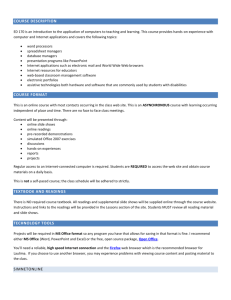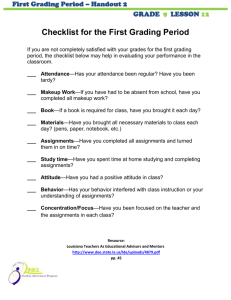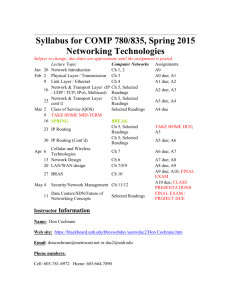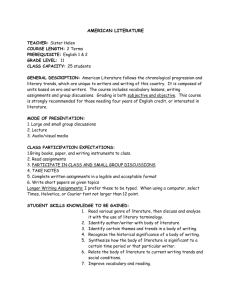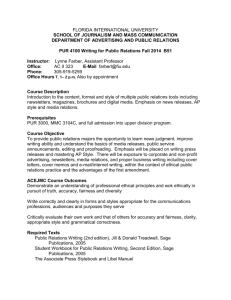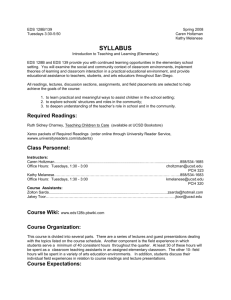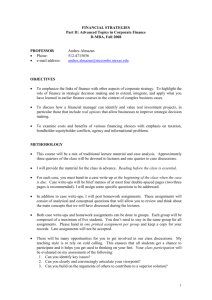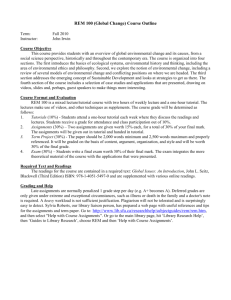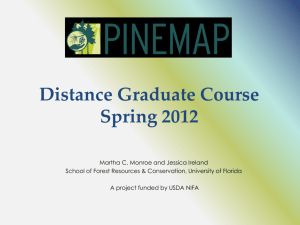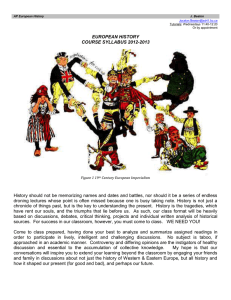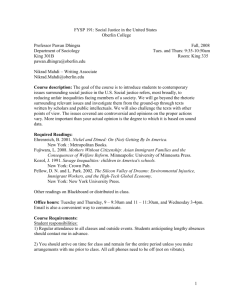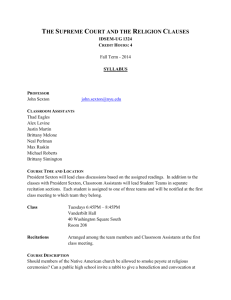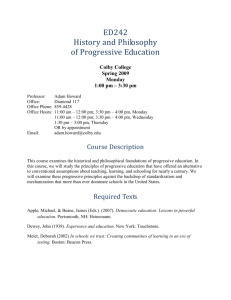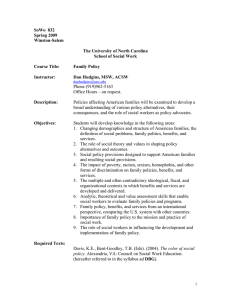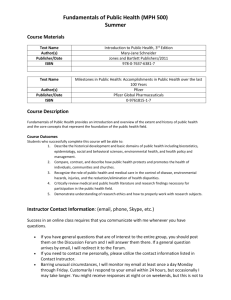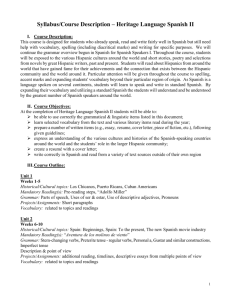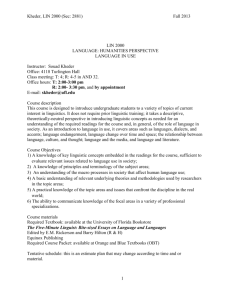FLORIDA INTERNATIONAL UNIVERSITY
advertisement
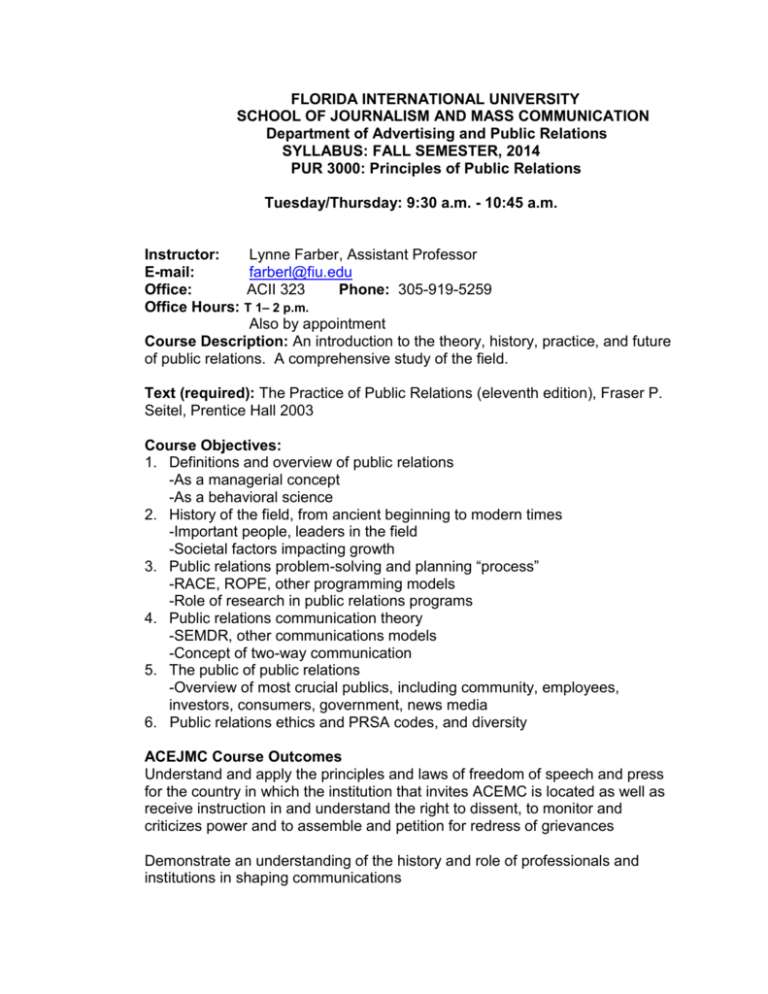
FLORIDA INTERNATIONAL UNIVERSITY SCHOOL OF JOURNALISM AND MASS COMMUNICATION Department of Advertising and Public Relations SYLLABUS: FALL SEMESTER, 2014 PUR 3000: Principles of Public Relations Tuesday/Thursday: 9:30 a.m. - 10:45 a.m. Instructor: Lynne Farber, Assistant Professor E-mail: farberl@fiu.edu Office: ACII 323 Phone: 305-919-5259 Office Hours: T 1– 2 p.m. Also by appointment Course Description: An introduction to the theory, history, practice, and future of public relations. A comprehensive study of the field. Text (required): The Practice of Public Relations (eleventh edition), Fraser P. Seitel, Prentice Hall 2003 Course Objectives: 1. Definitions and overview of public relations -As a managerial concept -As a behavioral science 2. History of the field, from ancient beginning to modern times -Important people, leaders in the field -Societal factors impacting growth 3. Public relations problem-solving and planning “process” -RACE, ROPE, other programming models -Role of research in public relations programs 4. Public relations communication theory -SEMDR, other communications models -Concept of two-way communication 5. The public of public relations -Overview of most crucial publics, including community, employees, investors, consumers, government, news media 6. Public relations ethics and PRSA codes, and diversity ACEJMC Course Outcomes Understand and apply the principles and laws of freedom of speech and press for the country in which the institution that invites ACEMC is located as well as receive instruction in and understand the right to dissent, to monitor and criticizes power and to assemble and petition for redress of grievances Demonstrate an understanding of the history and role of professionals and institutions in shaping communications Demonstrate an understanding of gender, race ethnicity, sexual orientation and, as appropriate, other forms of diversity in domestic society in relation to mass communications Demonstrate an understanding of the diversity of peoples and cultures and of the significance and impact of mass communications in a global society Demonstrate an understanding of professional ethical principles and work ethically in the pursuit of truth, accuracy, fairness and diversity Students with Disabilities If you have any special circumstances it is your responsibility to make the professor aware of them so you may be better accommodated. For questions and information, please call the FIU Office of Disability Services at 305-3483532 (MMC Campus: GC 190) or 305- 919-5346 (BBC Campus: WUC 139) Assignments/Readings: Reading assignments are listed in the attached course schedule. Occasionally, there will be handouts or reading pertinent to current events or special issues. You are expected to complete assigned readings prior to class and be ready to participate in class discussion. Departmental policy does not allow extra credit. The School of Journalism and Mass Communication (SJMC) fosters an environment of inclusivity and respect for diversity and multiculturalism. The SJMC educates students to embrace diversity and understand the root causes of discrimination, as well as social, ethnic, sexual, disability and gender-based exclusion. Grading: Three exams of equal weight. Grade Scale: A 92-100 A- 89-91 B+ 87-88 B 82-86 B- 79-81 C+ 77-78 C 70-76 D 66-69 F below 65 Departmental Writing Policy-Undergraduates: Good writing is vital to both advertising and public relations careers. Accordingly, students will be held to a uniform writing standard. After the completion of MMC 3104, all papers, reports and tests written outside of the classroom-regardless of length- will first be graded for content. Following that, the paper will be reviewed for writing. Should a paper contain six or more errors, the work will automatically lose 10 points, based on 100. At the instructor’s discretion, more stringent grading may be applied. Academic Honesty In meeting one of the major objectives of higher education, which is to develop self-reliance, it is expected that students will be responsible for the completion of their own academic work. The use of literature, notes, aids, or assistance from other sources should be clearly identified with respect to all course assignments and examinations. In addition, students are expected to use all resources, including books, journals, and computers only in legal and authorized ways. They should also refrain from falsification of records, attend class as required, and participate in the educational process without disrupting the orderly processes and functions of the University. IMPORTANT DATES TO REMEMBER Sept. 2: Last day to drop courses or withdraw from the University without a financial penalty Sept. 30: Last day to drop a course with DR grade/last day to withdraw from the University PUR 3000 COURSE OUTLINE SCHEDULE Readings and work assignments are to be completed by the time class begins on dates shown below. Date Readings T 8-26 None R 8-28 Text, Ch 1 Class Subject-Assignments Introduction to course. Explanation of assignments, grading. Opportunity for students to ask questions about the class and the public relations profession. What is public relations? An overview of the profession. . T 9-2 Text, Ch 2 The growth of public relations A historical perspective and additional overview of the profession. Review the Tylenol Case on page 41 for discussion. R 9-4 Text,Ch 3 Communications. Discussion of the importance of communications theory and different models. T 9-9 Text, Ch 4 Public Opinion. How are attitudes influenced? R 9-11 Text, Ch 5 Management. Role of public relations in the management process T 9-16 Text, Ch 6 Ethics. We will discuss the importance of ethics to the profession. R 9-18 Text, Ch 7 Public Relations and the Law. Overview of the various types of law affecting the PR practitioner. T 9-23 REVIEW R 9-25 TEST 1 T 9-30 . DIVERSITY DAY R 10-2 Text, Ch 9 Research. Types and methods; review the importance of research in public relations. Media Relations- First half of chapter Date Readings T 10-7 Text, Ch 10 R 10-9 Text, Ch 11 Class Subject-Assignments (cont) Media Relations: Part two Employee relations Community Relations T 10-14 Text, Ch 12 R 10-16 Text, Ch 13 Government Relations Consumer Relations T 10-21 R 10-24 REVIEW FOR TEST TWO TEST TWO T 10-28 Text, Ch 14 International Relations. Review the international growth of Public Relations; discuss the state of public relations in the different regions of the world. R 10-30 Text, Ch 15 Public Relations Writing. Review the fundamentals of writing as public relations professional. Discuss inverted pyramid. ____________________________________________________________________________ T 11-4 Text, Ch 16 Writing for the Eye and Ear R 11-7 Text, Ch 17 Integrated Marketing Communications T 11-11 Veteran’s Day R 11-13 Text, Ch 18 PR and Social Media ___________________________________________________________________________ T 11-18 Text Ch. 19 Crisis Management Review principles of how to manage a crisis situation. R 11-21 as current cases in the media. T 11-26 Text Ch 20 PR as a career R 11-28 Thanksgiving Holiday T 12-2 . Review for test three R 12-4 Test three ____________________________________________________________________________ FINAL EXAM WEEK: DECEMBER 8-12
